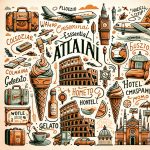Exploring the beauty of Italy and immersing oneself in the local culture requires some knowledge of the Italian language. A printable guide of essential Italian phrases will come in handy for travelers who want to navigate through the country with ease.
Italy is a country renowned for its rich history, stunning architecture, and mouth-watering cuisine. From wandering through ancient ruins in Rome to sipping on cappuccinos at a café in Florence, there is so much to see and experience. However, without some basic understanding of Italian phrases, travelers may find themselves struggling to communicate their needs or fully appreciate all that Italy has to offer.
Learning a few key Italian phrases not only makes it easier to navigate through Italian cities and towns but also shows respect for the local culture. By making an effort to learn greetings, pleasantries, and simple phrases, travelers can connect with Italians on a deeper level and create memorable experiences.
With this article, we aim to provide travelers with a comprehensive printable guide of Italian phrases that are essential for travel. Whether it’s ordering food at a trattoria, asking for directions to famous landmarks, or seeking help in an emergency situation, this guide will equip readers with the necessary language skills to confidently communicate throughout their journey. So grab your notebook and pen because it’s time to dive into these invaluable Italian phrases for travel.
Must-Know Greetings and Basic Phrases
Ciao, grazie, per favore: Start your journey by mastering these basic Italian greetings and courteous expressions. Learning these essential phrases will not only help you navigate through Italy with ease, but it will also allow you to connect with locals and immerse yourself in the rich culture of the country.
When approaching locals in Italy, a warm greeting can go a long way. The most common and versatile Italian greeting is “Ciao,” which can be used both as a hello and goodbye. If you want to be more formal or polite, you can use “Buongiorno” for good morning/afternoon or “Buonasera” for good evening.
Expressing gratitude is an important aspect of Italian culture, so mastering the phrase “Grazie” (thank you) is essential. To add even more appreciation to your thank-you, you can say “Grazie mille” (thank you very much) or “Molte grazie” (many thanks).
Additionally, it’s crucial to know how to say “Per favore” (please) when making requests or asking for assistance. This polite phrase shows respect and courtesy to those helping you along the way.
With these basic greetings and expressions under your belt, you’ll be able to confidently approach locals, order food at restaurants, and ask for directions during your travels in Italy.
| Italian Phrase | English Translation |
|---|---|
| Ciao | Hello/goodbye |
| Buongiorno | Good morning/afternoon |
| Buonasera | Good evening |
| Grazie | Thank you |
| Grazie mille | Thank you very much |
| Molte grazie | Many thanks |
| Per favore | Please |
Learning these basic Italian phrases will not only benefit your travel experience, but it will also show respect for the local culture and people. Italians appreciate when visitors make an effort to communicate in their language, even if it’s just a few simple phrases. So, take some time to practice these greetings and basic expressions before your trip to Italy, and you’ll surely make meaningful connections along the way.
Useful Vocabulary for Transportation and Navigation
Italy is known for its beautiful landscapes, ancient cities, and vibrant culture, making it a popular destination for travelers from around the world. However, getting around Italy can be challenging if you don’t speak the language. This section will provide useful vocabulary for transportation and navigation to help travelers navigate through the country with ease.
| Italian Phrase | English Translation |
|---|---|
| Dov’è la stazione dei treni? | Where is the train station? |
| Come si arriva all’aeroporto? | How do I get to the airport? |
| Vorrei un biglietto per Firenze. | I would like a ticket to Florence. |
| A che ora parte l’autobus per Roma? | What time does the bus to Rome leave? |
In addition to knowing how to ask for directions and book tickets, it’s also important to understand how public transportation works in Italy. Familiarize yourself with common terms such as “fermata dell’autobus” (bus stop), “biglietteria” (ticket office), and “orario” (schedule). This will help you navigate public transportation effectively and ensure that you reach your destinations on time.
It’s worth noting that Italy has an extensive and efficient train system, making it a popular mode of transportation for both locals and tourists. If you plan on traveling between cities, learning key phrases such as “partenza” (departure), “arrivo” (arrival), and “binario” (platform) will be extremely useful. Additionally, familiarize yourself with the names of major train stations in different cities.
By equipping yourself with these essential Italian phrases related to transportation and navigation, you can confidently explore Italy’s beautiful cities and landscapes. Whether you’re taking a scenic train ride through Tuscany or hopping on a bus to visit ancient ruins, knowing the language will give you the confidence to navigate through Italy like a local.
Food and Dining
When traveling to Italy, indulging in the country’s delicious cuisine is a must. However, navigating Italian menus and ordering food can be a bit challenging if you don’t speak the language. In this section, we will provide you with some essential Italian phrases for food and dining, allowing you to order like a pro and fully immerse yourself in the culinary delights of Italy.
Mastering Basic Food Ordering Phrases
To start your culinary adventure in Italy, it’s important to familiarize yourself with basic food ordering phrases. Here are some essential phrases that will come in handy when dining out:
- “Un tavolo per due/per quattro” (A table for two/four): Use this phrase to request a table for the number of people in your party.
- “Posso avere il menu?” (Can I have the menu?): When seated at a restaurant, use this phrase to ask for the menu. Alternatively, you can also say “Mi può portare il menu?”, which means “Can you bring me the menu?”.
- “Consigliere cosa è buono?” (Recommend something that is good): If you’re feeling adventurous or unsure about what to order, use this phrase to ask for recommendations from the waiter.
Understanding Menus and Expressing Preferences
Italian menus can sometimes be overwhelming with their variety of dishes. Here are some useful phrases that will help you navigate through the menu and express your preferences:
- “Che cosa consigli di primo/secondo piatto?” (What do you recommend for first course/second course?): Use this phrase when seeking suggestions for both appetizers and main courses.
- “Senza glutine/lattosio/noci” (Gluten-free/lactose-free/nut-free): If you have any dietary restrictions or allergies, make sure to mention them using these phrases so that your server can assist you accordingly.
- “Posso avere l’acqua del rubinetto?” (Can I have tap water?): In some restaurants, ordering bottled water can be expensive. If you prefer tap water, use this phrase to request it.
Understanding Italian Dining Etiquette
Italian dining etiquette differs from other cultures, and knowing a few key customs can enhance your dining experience. Here are some tips:
- “Coppetta per il gelato” (Cup for the ice cream): In Italy, it is common to serve gelato in cups rather than cones. Use this phrase if you prefer a cup instead of a cone.
- “Non si lascia la mancia in Italia” (You don’t leave a tip in Italy): Unlike in many other countries, tipping is not customary in Italy. However, leaving some loose change or rounding up the bill as a gesture of appreciation is always welcome.
By familiarizing yourself with these phrases and customs related to food and dining in Italy, you will be able to order like a pro and fully enjoy the culinary delights that the country has to offer.
Emergency Situations
Seeking Medical Assistance
In case of a medical emergency while traveling in Italy, it is crucial to know how to seek medical assistance and communicate your needs effectively. Include phrases such as “Ho bisogno di un dottore” (I need a doctor), “Mi fa male” (I’m in pain), and “Per favore, chiami un’ambulanza” (Please call an ambulance). Additionally, encourage travelers to carry important medical information, such as allergies or pre-existing conditions, written down in Italian to facilitate communication with healthcare professionals.
Reporting a Crime
While nobody hopes to encounter a crime during their trip, it is essential to be prepared and know how to report an incident to the authorities. Provide useful phrases such as “Ho subito un furto” (I’ve been robbed) or “Dove posso denunciare un crimine?” (Where can I report a crime?). Advise readers to immediately contact the local police (“chiamare la polizia”) if they find themselves in an emergency situation or need assistance related to criminal activity.
Dealing with Lost Belongings
Losing personal belongings can be distressing while traveling abroad. Help readers navigate this unfortunate situation by providing them with key phrases for communicating about lost items. Include expressions such as “Ho perso il mio passaporto” (I’ve lost my passport) or “Mi è stato rubato il portafoglio” (My wallet has been stolen). Encourage readers to notify the respective authorities promptly and ask for assistance from their hotel staff or the nearest embassy.
By equipping travelers with these important Italian phrases for emergency situations, they will feel more confident and prepared should an unforeseen event occur during their trip. Remind readers of the importance of staying calm in emergencies and seeking help from locals when needed.
Cultural Etiquette and Conversational Phrases
Italy is known for its rich cultural heritage and vibrant social interactions. To fully immerse yourself in the Italian way of life, it’s important to understand the country’s unwritten rules and engage in polite conversations with locals. This section will provide readers with valuable insights into cultural etiquette and conversational phrases that will help them navigate social situations more confidently during their travels.
Cultural Etiquette
To avoid any cultural misunderstandings or offending locals unintentionally, it’s essential to familiarize yourself with Italian cultural etiquette. Here are some key tips to keep in mind:
- Greetings: Italians value warm greetings when meeting someone, so be sure to make eye contact, smile, and offer a friendly “Buongiorno” (Good morning) or “Buonasera” (Good evening) when entering a shop or restaurant.
- Personal Space: Italians tend to stand close together during conversations and have physical interactions like handshakes, hugs, and kisses on the cheek. However, it’s always best to follow the lead of the person you are interacting with to ensure you don’t invade their personal space unintentionally.
- Table Manners: When dining out or visiting someone’s home for a meal, it’s customary to wait for the host or hostess to start eating before beginning your own meal. Additionally, using utensils instead of hands while eating is considered respectful.
Conversational Phrases
Engaging in conversations with locals can be a rewarding experience that allows you to learn more about Italian culture firsthand. Here are some useful phrases that will help you strike up conversations:
- “Come stai?” – This phrase means “How are you?”, and is a common greeting in Italy. It shows that you’re genuinely interested in the person’s well-being.
- “Mi scusi” – If you need to get someone’s attention or apologize for something, this phrase is incredibly useful. It translates to “Excuse me” and can be used in various social situations.
- “Mi potresti consigliare un ristorante tipico?” – If you’re looking for recommendations for a traditional restaurant, use this phrase that means “Could you recommend a typical restaurant to me?”. Locals will appreciate your interest in experiencing authentic Italian cuisine.
By respecting cultural etiquette and engaging in polite conversations with locals, travelers can deepen their understanding of Italian culture and forge meaningful connections. These conversational phrases will help readers interact confidently with Italians and create memorable experiences during their travels.
Shopping and Bargaining
When visiting Italy, one cannot miss the opportunity to indulge in the country’s renowned shopping scene. From high-end fashion boutiques to bustling street markets, Italy offers a diverse range of shopping experiences for every type of traveler. However, navigating the Italian shopping culture and achieving the best deals can be challenging without knowledge of the local language. In this section, we will explore essential phrases for shopping and bargaining in Italy.
First and foremost, it is important to learn basic greetings and expressions when entering a shop. A friendly “Buongiorno” (good morning) or “Buonasera” (good evening) accompanied by a smile sets a positive tone for your interaction with the shopkeeper. When browsing through items, you might want to ask questions or inquire about prices. The phrase “Quanto costa?” (How much does it cost?)
will come in handy in these situations. It is also common practice to ask if there are any discounts available by saying “C’è posto per un sconto?” (Is there room for a discount?). Politeness goes a long way in Italian culture, so make sure to say “Grazie” (thank you) regardless of whether you make a purchase or not.
One important aspect of shopping in Italy is bargaining, especially in markets and smaller establishments. Bargaining is an art that can lead to significant savings if done correctly. Start by politely asking if there is any flexibility on the price with phrases like “Possiamo trattare?” (Can we negotiate?)
or “Posso avere uno sconto?” (Can I have a discount?). Keep in mind that bargaining may not always be accepted, particularly in larger retail stores where fixed prices are more common. However, in local markets known for their vibrant atmosphere and haggling culture, don’t be afraid to engage in friendly negotiation.
In addition to learning useful phrases for shopping and bargaining, familiarizing yourself with some essential vocabulary related to clothes, sizes, and styles is also helpful. Knowing the Italian words for common clothing items such as “scarpe” (shoes), “camicia” (shirt), or “vestito” (dress) will enable you to navigate through stores more confidently. Moreover, understanding Italian sizes can help you find the perfect fit.
For example, if you need a small size, ask for “una taglia piccola.” Lastly, it’s worth noting that Italians take pride in their fashion sense, so complimenting someone on their outfit with phrases such as “Mi piace il tuo abbigliamento” (I like your outfit) can lead to friendly interactions and potentially fruitful shopping experiences.
Additional Resources and Online Tools to Learn Italian
Learning Italian phrases for travel is essential for having a smooth and enjoyable trip to Italy. In addition to using a printable guide of essential phrases, there are also various online resources and tools available that can help you learn Italian more comprehensively. Here are some additional resources and online tools that can assist you in learning the language:
- Online Language Learning Platforms: Websites and apps like Duolingo, Babbel, and Rosetta Stone offer comprehensive Italian language courses that cater to different proficiency levels. These platforms provide interactive lessons, quizzes, and exercises to improve your vocabulary, grammar, and pronunciation.
- Language Exchange Websites: Joining language exchange websites such as HelloTalk or Tandem can connect you with native Italian speakers who are interested in learning your native language. Through these platforms, you can engage in conversations with Italians and practice speaking Italian in a supportive environment.
- YouTube Channels: There are several YouTube channels dedicated to teaching Italian for beginners as well as more advanced learners. Channels like LearnAmo, Italy Made Easy, or Lucrezia Oddone provide free video lessons covering grammar rules, vocabulary building exercises, cultural insights, and pronunciation tips.
- Podcasts: Listening to Italian podcasts is an effective way to improve your listening skills while learning about various aspects of Italian culture. Some popular podcasts include Coffee Break Italian, News in Slow Italian, or LearnItalianPod.
- Online Tutors: If you prefer one-on-one instruction tailored to your specific needs, hiring an online tutor can be a great option. Platforms like iTalki or Preply connect students with certified language tutors who can provide personalized lessons through video calls.
By utilizing these additional resources and online tools alongside the printable guide of essential phrases for travel, you will be well-equipped to learn Italian effectively and confidently navigate through Italy during your trip.
Conclusion
In conclusion, learning Italian phrases for travel is essential for anyone planning to explore the beauty of Italy and immerse themselves in the local culture. By mastering basic greetings and polite expressions, travelers can approach locals with confidence and build connections. Additionally, understanding key vocabulary related to transportation will enable them to navigate through the country easily.
Ordering food like a pro is another important aspect of traveling in Italy. With essential Italian phrases for dining, readers can indulge in delicious cuisine and experience the true flavors of Italy. Furthermore, being prepared for emergency situations by knowing relevant phrases will help ensure their safety and peace of mind during their trip.
Beyond these practical considerations, understanding cultural etiquette and conversational phrases allows travelers to engage more confidently with Italians, unlocking a deeper appreciation and understanding of the country’s way of life. Shopping and bargaining phrases are also crucial for enjoying the unique shopping experiences that Italy offers.
By providing a printable guide of essential Italian phrases for travel along with additional online resources and tools, readers will have all they need to communicate effectively and continue learning beyond their trip. Ultimately, conquering Italy with confidence means embracing the language and immersing oneself in the culture, creating unforgettable memories and experiences along the way.
Frequently Asked Questions
How to learn Italian phrases for travel?
Learning Italian phrases for travel can be an exciting and rewarding experience. To start, it’s important to immerse yourself in the language by listening to audio material or finding online tutorials that offer pronunciation guidance.
Additionally, investing in a good Italian phrasebook or language learning app can provide you with essential phrases that are commonly used during travel situations, such as greetings, asking for directions, ordering food, and making small talk. Practicing these phrases through repetition and speaking with native speakers whenever possible will help you become more comfortable with using them in real-life situations.
What do Italians say instead of Bon Voyage?
Instead of saying “Bon Voyage,” Italians usually use the phrase “Buon viaggio.” This expression literally translates to “good journey” and is commonly used to wish someone a safe and pleasant trip ahead.
Whether you’re bidding farewell to a friend or expressing well-wishes to a traveler, using “Buon viaggio” is a thoughtful way of sending them off on their journey. Remembering this simple phrase can help you blend in better with the local culture when interacting with Italians.
What are the basic Italian phrases?
Learning some basic Italian phrases can greatly enhance your experience when visiting Italy or engaging with Italian speakers. Greetings such as “Ciao” (hello/hi) and “Grazie” (thank you) are essential starting points for any conversation. It’s also useful to know how to introduce oneself by saying “Mi chiamo [your name]” (My name is…) or ask others their name by saying “Come ti chiami?”
(What is your name?). Other fundamental phrases include common expressions like “Mi scusi” (Excuse me), which can be handy when seeking assistance or apologizing for any inconvenience caused. Being familiar with basic numbers, colors, days of the week, and common words related to transportation, dining out, shopping, and accommodation will further enhance your ability to communicate effectively while traveling in Italy.

I’m a passionate traveler, writer, and Italophile. My fascination with Italy’s history, art, and culture has led me on countless adventures across the Italian landscape. Through “I Live Italy,” I share my love for this extraordinary country and aims to inspire others to explore its boundless beauty.





